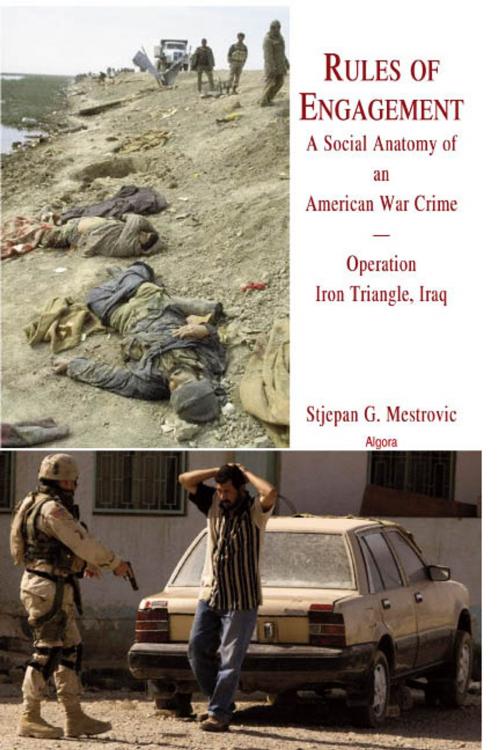Rules of Engagement?
A Social Anatomy of an American War Crime - Operation Iron Triangle, Iraq
Nonfiction, Reference & Language, Law, Military| Author: | Stjepan G. Mestrovic | ISBN: | 9780875866741 |
| Publisher: | Algora Publishing | Publication: | December 15, 2009 |
| Imprint: | Algora Publishing | Language: | English |
| Author: | Stjepan G. Mestrovic |
| ISBN: | 9780875866741 |
| Publisher: | Algora Publishing |
| Publication: | December 15, 2009 |
| Imprint: | Algora Publishing |
| Language: | English |
Coalition and Iraqi troops raided an insurgent training camp southwest of Tikrit as part of Operation Iron Triangle May 9-11, 2006. After intelligence sources identified the 60-square-mile Muthana Chemical Complex, 200 soldiers from the 4th Iraqi Army Division and about 230 soldiers from the 101st Airborne Division assaulted the complex. The operation resulted in the detention of 200 suspected terrorists and the confiscation of weapons and propaganda materials.
Mestrovics book investigates the three soldiers who were charged with murder after questions were raised about the rules of engagement (ROE), which were to kill every military aged male on sight for Operation Iron Triangle. The statements given by the three soldiers presented three distinct versions of what happened. The Prosecution avoided going to trial by getting the defendants to agree to plea bargains. Colonel Steele, the commanding officer who issued the unlawful ROE, was never prosecuted and neither was anyone further up the chain of command. Pfc. Corey Clagett was sentenced to 18 years in prison in January 2007.
As described in a CBS interview,
The soldiers first told investigators they shot the detainees because they were attempting to flee a story they now say they made up and that commanders had given them orders to kill all military-age males on the mission.
Two of those soldiers, Spc. William B. Hunsaker and Spc. Juston R. Graber, have changed their stories and pleaded guilty. The squad leader, Staff Sgt. Raymond Girouard, is awaiting his court-martial.
(Sgt. Girouard) said we were going to cut the zip ties loose and kill the detainees," Clagett told the military judge....
Four other soldiers from the division's 2nd Brigade Combat Team are accused of raping and killing an Iraqi teenager and killing three others in her family last March. A former Army private also faces murder and rape charges in federal court for the same incident.
Books about the war in Iraq have until now ignored questioning rules of engagement. Mestrovic challenges U.S. perceptions of responsibility for war crimes, which are viewed differently in other countries.
At the Hague, many high-ranking officials including the former President of Yugoslavia, Slobodan Milosevic, have stood trial for war crimes under the doctrine of command responsibility, the view that commanders are responsible even if they did not pull the trigger or give the order. Commanders should known and should take steps to prevent the commission of crimes by their subordinates. However, in the U.S., low-ranking soldiers are court-martialed under the principle stated in the Uniform Code of Military Justice (UCMJ) that obedience to unlawful orders is not a defense.
Both attitudes are inspired by the Nuremberg trials, albeit in starkly divergent ways. The ICTY seems to reject the excuse for World War II atrocities, namely, "We didn't know". Conversely, the U.S. military system seems to reject the excuse, "We were just following orders" and insists that low-ranking soldiers are responsible for their own actions. Which approach is more just?
A distinguished expert in matters of war crimes, Mestrovic has testified at the trials regarding Abu Ghraib torture and prisoner abuse and at the International Criminal Tribunal for the former Yugoslavia. Currently, Mestrovic is working on two more books concerning the Abu Ghraib cases on high ranking generals, other officers and stories of soldiers that slipped through the cracks. As a sociologist, Prof. Mestrovic bases his study of the participants' behavior in Operation Iron Triangle in the idea of "fake sincerity" as defined and described by Dr. David Riesman in his classic work, The Lonely Crowd, tying together fake commitment to the Geneva Conventions and fake commitment to the rule of law, false versions of policies announced to the American people, fake due process for the defendants, and fake goals of promoting democracy.
This book stands alone in analyzing a war crime from Iraq that involved the murder of noncombatants, questionable rules of engagement, and the doctrine of command responsibility. The questions are not only about the facts of the case but about the military's principles, rules, and code of honor.
Once the trial was canceled, the evidence that would allow the public to judge what happened and why were buried. Far from being a cut and dry legal case, this story can be read as a mystery that will never fully resolved.
Coalition and Iraqi troops raided an insurgent training camp southwest of Tikrit as part of Operation Iron Triangle May 9-11, 2006. After intelligence sources identified the 60-square-mile Muthana Chemical Complex, 200 soldiers from the 4th Iraqi Army Division and about 230 soldiers from the 101st Airborne Division assaulted the complex. The operation resulted in the detention of 200 suspected terrorists and the confiscation of weapons and propaganda materials.
Mestrovics book investigates the three soldiers who were charged with murder after questions were raised about the rules of engagement (ROE), which were to kill every military aged male on sight for Operation Iron Triangle. The statements given by the three soldiers presented three distinct versions of what happened. The Prosecution avoided going to trial by getting the defendants to agree to plea bargains. Colonel Steele, the commanding officer who issued the unlawful ROE, was never prosecuted and neither was anyone further up the chain of command. Pfc. Corey Clagett was sentenced to 18 years in prison in January 2007.
As described in a CBS interview,
The soldiers first told investigators they shot the detainees because they were attempting to flee a story they now say they made up and that commanders had given them orders to kill all military-age males on the mission.
Two of those soldiers, Spc. William B. Hunsaker and Spc. Juston R. Graber, have changed their stories and pleaded guilty. The squad leader, Staff Sgt. Raymond Girouard, is awaiting his court-martial.
(Sgt. Girouard) said we were going to cut the zip ties loose and kill the detainees," Clagett told the military judge....
Four other soldiers from the division's 2nd Brigade Combat Team are accused of raping and killing an Iraqi teenager and killing three others in her family last March. A former Army private also faces murder and rape charges in federal court for the same incident.
Books about the war in Iraq have until now ignored questioning rules of engagement. Mestrovic challenges U.S. perceptions of responsibility for war crimes, which are viewed differently in other countries.
At the Hague, many high-ranking officials including the former President of Yugoslavia, Slobodan Milosevic, have stood trial for war crimes under the doctrine of command responsibility, the view that commanders are responsible even if they did not pull the trigger or give the order. Commanders should known and should take steps to prevent the commission of crimes by their subordinates. However, in the U.S., low-ranking soldiers are court-martialed under the principle stated in the Uniform Code of Military Justice (UCMJ) that obedience to unlawful orders is not a defense.
Both attitudes are inspired by the Nuremberg trials, albeit in starkly divergent ways. The ICTY seems to reject the excuse for World War II atrocities, namely, "We didn't know". Conversely, the U.S. military system seems to reject the excuse, "We were just following orders" and insists that low-ranking soldiers are responsible for their own actions. Which approach is more just?
A distinguished expert in matters of war crimes, Mestrovic has testified at the trials regarding Abu Ghraib torture and prisoner abuse and at the International Criminal Tribunal for the former Yugoslavia. Currently, Mestrovic is working on two more books concerning the Abu Ghraib cases on high ranking generals, other officers and stories of soldiers that slipped through the cracks. As a sociologist, Prof. Mestrovic bases his study of the participants' behavior in Operation Iron Triangle in the idea of "fake sincerity" as defined and described by Dr. David Riesman in his classic work, The Lonely Crowd, tying together fake commitment to the Geneva Conventions and fake commitment to the rule of law, false versions of policies announced to the American people, fake due process for the defendants, and fake goals of promoting democracy.
This book stands alone in analyzing a war crime from Iraq that involved the murder of noncombatants, questionable rules of engagement, and the doctrine of command responsibility. The questions are not only about the facts of the case but about the military's principles, rules, and code of honor.
Once the trial was canceled, the evidence that would allow the public to judge what happened and why were buried. Far from being a cut and dry legal case, this story can be read as a mystery that will never fully resolved.















